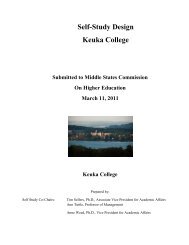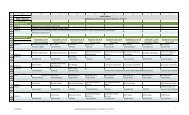final version of the self-study document - Keuka College's Middle ...
final version of the self-study document - Keuka College's Middle ...
final version of the self-study document - Keuka College's Middle ...
You also want an ePaper? Increase the reach of your titles
YUMPU automatically turns print PDFs into web optimized ePapers that Google loves.
Effective learning assessment starts with clear learning goals, and <strong>the</strong> syllabus is <strong>the</strong><br />
tangible place where instructors communicate and students see <strong>the</strong> course expectations<br />
and goals (course, Program, Gen Ed, and E-LEAP). Each semester, a copy <strong>of</strong> each<br />
syllabus must be submitted to and retained by <strong>the</strong> Academic Affairs <strong>of</strong>fice. However, in<br />
2011, to ensure <strong>the</strong> inclusion <strong>of</strong> syllabus learning goals, <strong>the</strong> Vice President for Academic<br />
Affairs created a syllabus checklist (Appendix 4.20 Course Syllabus Checklist) that now<br />
must accompany each syllabus copy each semester. Faculty must clearly indicate on <strong>the</strong><br />
checklist that all applicable goals are communicated on <strong>the</strong> syllabus and on <strong>the</strong> course’s<br />
learning management system (Moodle) site, if applicable. The checklist is helping to<br />
bring greater consistency to this (and o<strong>the</strong>r) important parts <strong>of</strong> <strong>the</strong> syllabus. It serves as a<br />
beginning touchstone to both <strong>the</strong> faculty member and <strong>the</strong> students that learning and<br />
assessment are critical to <strong>the</strong> success <strong>of</strong> <strong>the</strong> class.<br />
The College has continued to make significant progress in developing assessment plans,<br />
integrating goals (course, program and institutional), collecting assessment evidence, and<br />
using this evidence to confirm and improve student learning. Assessment <strong>of</strong> student<br />
learning routinely occurs across our learning locations (traditional campus, New York<br />
State ASAP locations, and overseas sites) and across our different teaching platforms<br />
(i.e., face-to-face, hybrid, and online). We continue to work to better align goals and<br />
streamline assessment efforts to make our assessment more useful, cost-effective,<br />
accurate, planned, and sustainable, with <strong>the</strong> ultimate goal <strong>of</strong> continuously improving<br />
student learning. The assessment plan matrix provides an overview <strong>of</strong> <strong>the</strong> learning goal,<br />
identifies where <strong>the</strong> learning goal is addressed, lists assessment activities, and includes<br />
<strong>the</strong> analysis utilization plan (Appendix 4.21 Table 4.3 <strong>Keuka</strong> College Assessment Plan<br />
Matrix), and <strong>the</strong> alignment and hierarchy <strong>of</strong> learning goals is presented in a diagram<br />
(Appendix 4.17 Assessment <strong>of</strong> Student Learning Plan Diagram).<br />
General Education<br />
As described in <strong>the</strong> 2012-2013 <strong>Keuka</strong> College Record, “A <strong>Keuka</strong> College education is<br />
based on <strong>the</strong> liberal arts courses as delivered primarily through our general education<br />
program. The general education program is <strong>the</strong> common educational experience <strong>of</strong> all<br />
<strong>Keuka</strong> College students, providing <strong>the</strong>m with <strong>the</strong> breadth <strong>of</strong> knowledge, intellectual<br />
skills, and personal dispositions <strong>of</strong> an educated person” (63). Gen Ed requirements are<br />
based on a set <strong>of</strong> student learning goals which are organized into three learning<br />
categories: Foundational Skills, Breadth <strong>of</strong> Knowledge, and Dispositions (Appendix 4.22<br />
General Education Learning Goals). Students in <strong>the</strong> Accelerated Studies for Adults<br />
Program typically are admitted with 60 credits or more <strong>of</strong> transferable credit and meet<br />
most general education requirements through a credit evaluation process, although <strong>the</strong>y<br />
may need additional credits to meet prerequisite, liberal arts, or graduation requirements.<br />
Students in <strong>the</strong> overseas programs take <strong>the</strong> same general education courses as <strong>the</strong>ir<br />
traditional campus counterparts, delivered by <strong>the</strong>ir home universities, and <strong>the</strong>se courses<br />
are accepted as transfer credits and counted toward graduation requirements. Capstone<br />
courses in <strong>the</strong> major build upon general education learning outcomes across all delivery<br />
and format <strong>of</strong>ferings.<br />
Page 12 <strong>of</strong> 31 Chapter 4: Inst. Effectiveness & Assessment




